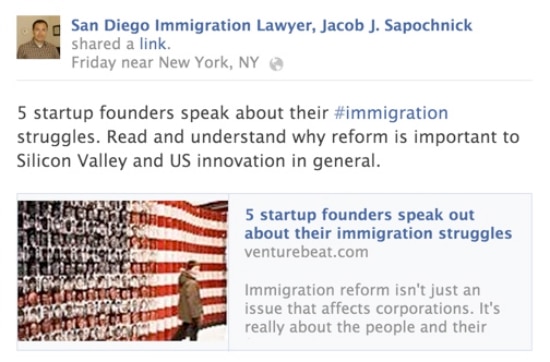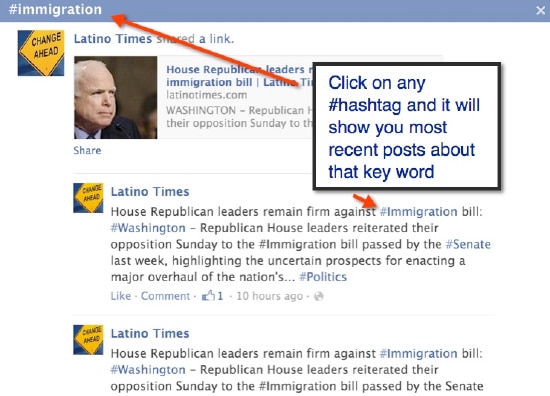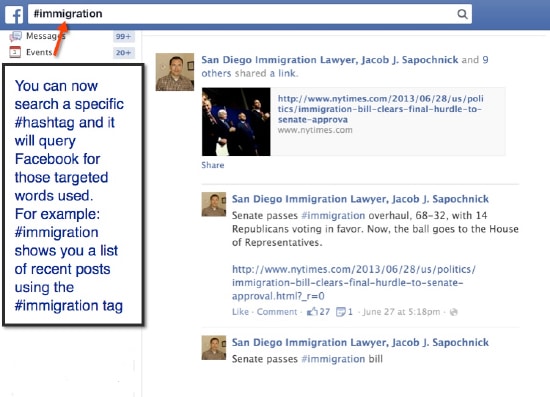Hashtags have long been a staple of social media sites like Twitter and Instagram, as well as Tumblr and Pinterest. Facebook’s new hashtag platform, launched in July, approaches hashtagging in a similar fashion.
For the uninitiated, a hashtag consists of one or more words or phrases, typically at the end of a social media post. The characters in a hashtag are typed without spaces and preceded by a hashtag or pound (#) sign, for example: “5 startups talk about #immigration.”

The function of a hashtag is to tie various social media posts together by relating them to a single topic. These topics can offer connections to a wide range of groups, people and events. Click on a hashtag in a post, or type a hashtag into the search bar, and you are directed to a feed or stream of comments on that particular subject.
Hashtagging in Facebook
In Facebook, every hashtag will have its own unique URL, with a field at the top for status updates. A well-placed hashtag can increase your firm’s visibility, exposing your practice to prospects by linking your single post to countless others. Facebook hashtags give attorneys, and everyone else for that matter, the opportunity to reach across “friends” borders to get involved in like-minded discussions. Consider that for a moment: If anyone is interested in San Diego, searching a #sandiego hashtag can lead them to a variety of places, and more importantly people, who also have an interest in San Diego today.
Leverage the Facebook #Hashtag Search
Targeted hashtags can increase your pool of potential clients by driving traffic to your website or blogs. Similar to figuring out the best key words for your practice for SEO, you need to determine the hashtags that will allow you to “mine” people who may have need for your services. As you consider which key word or phrase to use, do a little research first to see what your audience may want to “hear” about, or what they are asking for. Depending on your area of practice, it shouldn’t be difficult to find the Facebook hashtags that can benefit you.
To create a hashtag, simply remove the spaces between your key words and put a hashtag in front of the phrase. Include your hashtag each time you post on that topic in Facebook.
Hashtags are not yet integrated outside of Facebook for search engine optimization — Google does not have a way to reach into Facebook hashtags and search them like it can with Twitter or Google+. But it’s coming. Meantime, hashtags will make it much easier for Facebook users to discuss their favorite topics with other users — and that is an opportunity for you.
A Good Hashtag is a Targeted Hashtag
By making certain your hashtags address relevant topics, you can ensure they draw the right type of prospects for your practice. Here are a few additional tips that can help you make the most out of each marketing post your law firm publishes.
- Keep hashtags short. When people use long or multiple hashtags in the same post, users may see them as spam instead of a legitimate message. Concentrate on using one — or, at the most, two — concise hashtags on each post. For example: #familylaw, #realestate or #sandiegolaw.
- Take advantage of trending topics. If you can add your voice to a hashtag that is already popular, you can leverage the power of that existing resource. Just make sure that it has a true relationship to your own unique post.
- Always use hashtags to your advantage with the end in mind: reaching your targeted audience, and increasing credibility and top-of -mind awareness of your firm.
Consumer brands are leveraging hashtag technology by strategically tagging their posts with topics and categories that speak to their markets. Now that the largest social network in the world is incorporating hashtags, the question is not whether or not to use a hashtag in your Facebook marketing, but #whatareyouwaitingfor?
Illustration ©iStockPhoto.com.

















